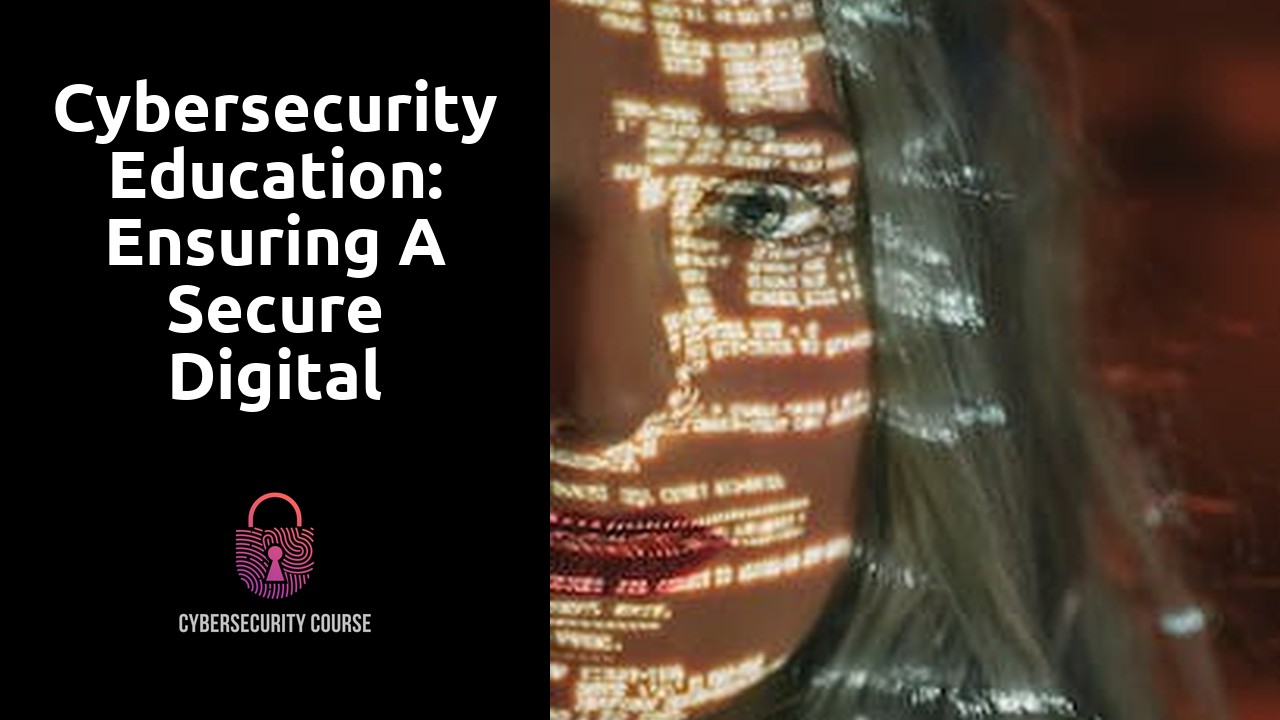
Cybersecurity Education: Ensuring a Secure Digital Future
Table Of Contents
The Importance of Digital Safety in the Modern World
In the modern world, digital safety has become more important than ever before. With the increasing reliance on technology and the constant connectivity provided by the internet, individuals and organizations are constantly exposed to various online threats. From cyberattacks to data breaches, the consequences of poor digital safety can be devastating.
Protecting personal information and securing digital assets should be a top priority for everyone in today's digital age. Whether it is safeguarding sensitive financial data or ensuring the privacy of personal communications, taking proactive measures to enhance digital safety is essential. By staying vigilant and implementing effective security measures, individuals can mitigate the risks associated with online activities and navigate the digital landscape with confidence.
Building a Foundation of Security Awareness
Building a strong foundation of security awareness is crucial in today's digital age. With cyber threats on the rise, it is essential for individuals to be proactive in protecting their personal information and staying safe online. This begins with understanding the potential risks and being aware of the various tactics employed by cybercriminals to exploit vulnerabilities.
One key aspect of building security awareness is staying up-to-date with the latest security threats and trends. This can be achieved through regular cybersecurity training and education programs. By equipping individuals with the necessary knowledge and skills, they can better recognize and respond to potential threats. Additionally, integrating security awareness into daily routines and practices can become second nature, minimizing the risk of falling victim to cyber attacks. By actively promoting security awareness, individuals can play a vital role in safeguarding their personal information and contributing to a safer digital environment for all.
Navigating the Threat Landscape: Understanding Online Risks
Online risks are a constant presence in today's digital landscape. With every click, tap, or swipe, individuals open themselves up to potential threats. Understanding these risks is the first step in navigating the ever-evolving threat landscape and protecting oneself online.
One of the most common online risks is phishing. Cybercriminals often employ deceptive tactics to trick individuals into revealing sensitive information, such as login credentials or financial details. Phishing attacks can take various forms, such as fake emails or websites that imitate trusted organizations. Being able to identify and report suspicious emails or links is crucial in safeguarding personal and sensitive information from falling into the wrong hands.
Empowering Individuals: The Role of Cybersecurity Education
With the increasing digitization of our everyday lives, cybersecurity education has become vital in empowering individuals to protect themselves online. The role of cybersecurity education goes beyond just providing information on threats and attacks; it aims to create a mindset of awareness and proactive engagement with digital safety. By equipping individuals with the knowledge and skills to identify potential risks, they are empowered to make informed decisions about their personal information and privacy.
Cybersecurity education plays a crucial role in demystifying the complex world of digital security. Many individuals perceive cybersecurity as a daunting and technical field, leading to a sense of helplessness and reliance on others for protection. However, through education, these misconceptions can be debunked, and individuals can be empowered to take control of their own digital safety. By breaking down complex concepts into digestible information and providing practical guidance, cybersecurity education helps individuals understand that they have agency in safeguarding their online presence.
Unveiling the Myths: Debunking Common Misconceptions about Digital Security
The world of digital security is filled with myths and misconceptions that can often lead individuals astray. One common misconception is that only large corporations or high-profile individuals are at risk of cyber attacks. In reality, anyone who uses the internet is a potential target. Cybercriminals do not discriminate based on age, occupation, or social status. They are constantly seeking vulnerabilities and exploiting them for their own gain. Therefore, it is crucial for every individual to understand the importance of digital security and take proactive steps to protect themselves online.
Another prevalent myth is that antivirus software alone is sufficient to keep one's digital devices and data secure. While antivirus software plays a crucial role in detecting and neutralizing known malware and viruses, it is not a foolproof solution. Cyber threats are constantly evolving, and new forms of malware are being introduced into the digital landscape every day. Therefore, it is essential to supplement antivirus software with additional security measures such as strong passwords, regular software updates, and two-factor authentication. By debunking these myths and gaining a clear understanding of digital security, individuals can take the necessary steps to protect themselves and their digital assets.
Strengthening Defenses: Best Practices for Protecting Personal Information
In our increasingly digital world, protecting our personal information is more crucial than ever. With the growing number of online threats and cyberattacks, it is essential to implement effective practices that strengthen our defenses and safeguard our sensitive data.
One of the best practices for protecting personal information is to regularly update passwords. Using strong, unique passwords for each online account significantly reduces the risk of unauthorized access. A strong password typically consists of a combination of letters (both uppercase and lowercase), numbers, and symbols. Additionally, it is essential to avoid using easily guessable information, such as birthdays or names, as part of our passwords. Regularly changing passwords and using password management tools can further enhance our defense against potential attacks.
Related Links
Promoting Cybersecurity Literacy in Today's Digital SocietyEnhancing Online Safety and Security through Cybersecurity Courses
Case Studies in Data Breach Response and Lessons Learned
Incident Reporting and Communication in Data Breach Response
Best Practices for Data Breach Investigation and Remediation
Cybersecurity Training for Data Breach Response
Legal Considerations in Data Breach Response